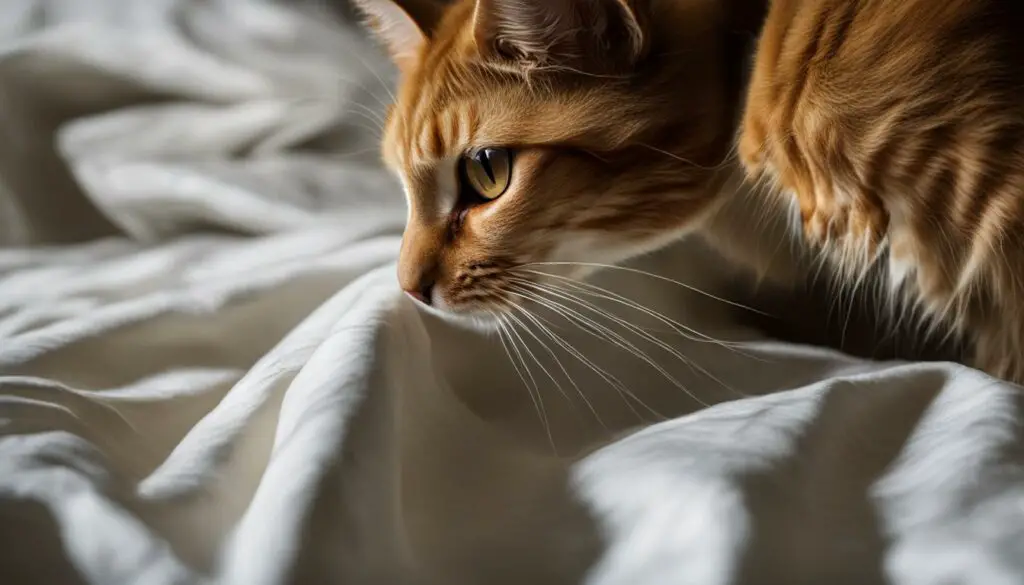Have you ever woken up to the unpleasant surprise of finding your beloved cat’s poop on your bed? It’s not a pleasant experience, but before you get upset, remember that there are reasons behind this behavior. Understanding why your cat is pooping on the bed is the first step towards finding a solution.
When it comes to cat behavior, there are several factors that could contribute to this unwanted behavior. It could be due to illness, stress or insecurity, situational unhappiness, or even litter box problems. Each of these factors requires a unique approach to address the issue and prevent it from happening again.
Training your cat to use the litter box is essential, but accidents can still happen. Whether your cat is a notorious bed pooper or it’s their first time, it’s crucial to remain calm and take the necessary steps to resolve the problem.
Key Takeaways:
- Understand that there are reasons behind your cat’s bed pooping behavior.
- Identify the specific cause, such as illness, stress, unhappiness, or litter box issues.
- Consult a veterinarian to rule out any underlying medical conditions.
- Create a stress-free environment and address any environmental changes.
- Ensure a clean and comfortable litter box and consider litter preferences.
Illness as a Cause for Cat Pooping on Bed
When a cat starts pooping on the bed, it’s crucial to consider any underlying medical conditions. Cats may choose alternative places to defecate due to illness or discomfort associated with the litter box. Several illnesses can contribute to this behavior, including:
- IBS (Irritable Bowel Syndrome): This condition can cause gastrointestinal upset and pain, leading a cat to seek a more comfortable place to relieve themselves.
- Cancer: Some forms of cancer can cause digestive issues and discomfort, prompting a cat to find a different spot to poop.
- Intestinal parasites: Worm infestations, such as hookworms or roundworms, can cause gastrointestinal distress and make a cat avoid using the litter box.
It’s crucial to address any potential medical issues with a visit to the veterinarian. They can diagnose and treat conditions like IBS, cancer, or intestinal parasites, providing the necessary relief and stopping the cat’s inappropriate defecation behavior.
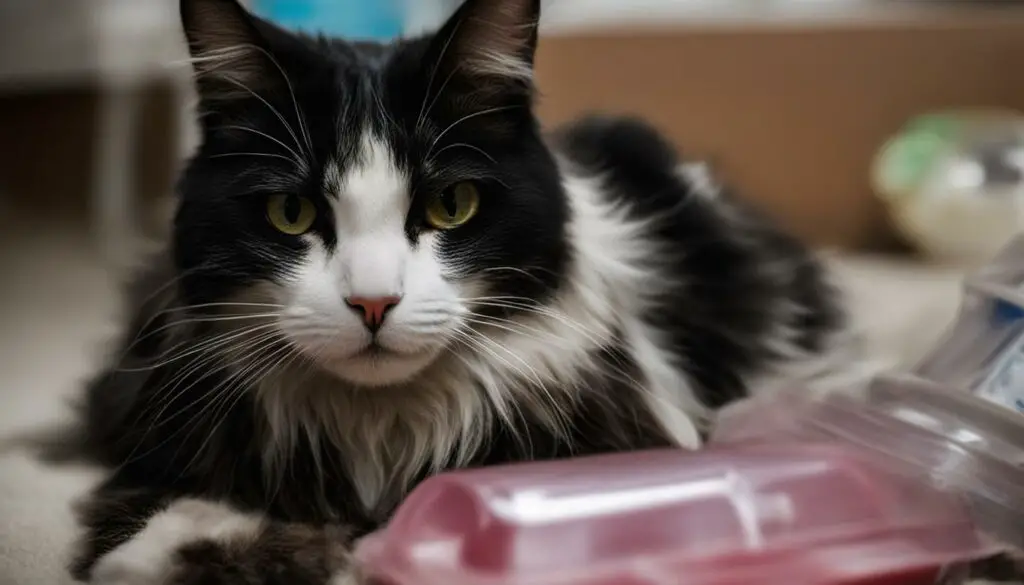
Symptoms of Illness-related Litter Box Avoidance
In addition to pooping on the bed, cats with medical issues may exhibit other symptoms, such as:
- Vomiting
- Diarrhea
- Weight loss
- Decreased appetite
These symptoms should not be ignored, as they may be indicative of an underlying health problem causing the cat’s litter box avoidance.
| Illness | Symptoms |
|---|---|
| IBS | Gastrointestinal upset, abdominal pain |
| Cancer | Decreased appetite, weight loss |
| Intestinal parasites | Diarrhea, weight loss |
By addressing any illness and providing appropriate treatment, pet owners can help their cats regain their health and prevent further inappropriate defecation on the bed.
Situational Unhappiness and Cat Pooping on Bed
Cats are very sensitive to environmental changes, and they may act out their unhappiness in unpleasant ways, such as pooping on the bed. Situational unhappiness can occur when there are changes in the household, like a person returning from a business trip, causing stress for the cat. Separation anxiety can also contribute to a cat’s stress and unhappiness, especially if they have recently joined a new household. Understanding and addressing the specific trigger for situational unhappiness is important in resolving the cat’s pooping behavior.
Effects of Environmental Changes on Cats
Environmental changes can have a significant impact on a cat’s well-being and behavior. Cats thrive on routine and stability, so any changes in their environment can cause stress and anxiety. This can manifest in various ways, including pooping on the bed as a means of expressing their unhappiness.
“Situational unhappiness can occur when there are changes in the household, like a person returning from a business trip, causing stress for the cat.”
Whether it’s a new family member, rearranging furniture, or moving to a new home, cats need time to adjust and feel secure in their surroundings. In the meantime, they may exhibit undesirable behaviors, such as pooping on the bed. It’s important to provide a calm and predictable environment for the cat, gradually introducing any changes and offering plenty of reassurance and comfort.
Addressing Separation Anxiety
Separation anxiety can be a significant source of stress for cats, particularly if they have recently joined a new household. Cats are social animals and form strong attachments to their human companions. When separated from their loved ones, they may experience anxiety and resort to undesirable behaviors, including pooping on the bed.
To address separation anxiety, it’s important to gradually acclimate the cat to being alone. Providing comfort items, such as a warm blanket or a piece of clothing with the owner’s scent, can help alleviate anxiety. Interactive toys and plenty of mental and physical stimulation can also distract the cat from feeling lonely or stressed. Additionally, consulting with a veterinarian or animal behaviorist may provide valuable insights and guidance in managing separation anxiety.
Tips for Resolving the Issue
When addressing situational unhappiness and separation anxiety, there are several strategies that can help resolve a cat’s pooping behavior. These include:
- Creating a calm and predictable environment
- Gradually introducing changes
- Providing comfort items and stimulation
- Seeking professional advice, if necessary
By understanding the underlying causes of the cat’s unhappiness and implementing appropriate solutions, pet owners can help their furry companions feel more secure and reduce the likelihood of them pooping on the bed.
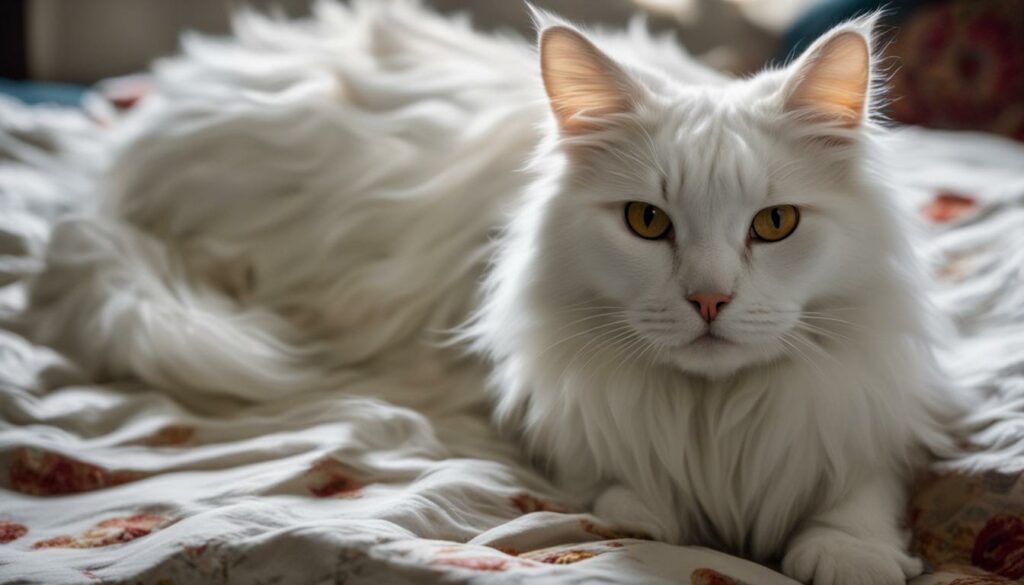
Stress and Insecurity Leading to Cat Pooping on Bed
Stress and insecurity can be common reasons why a cat may choose to poop on the bed. This behavior is often seen in cats who have recently moved to a new home. The stress and insecurity caused by the unfamiliar surroundings and separation from their previous home and family can lead to inappropriate elimination.
To help alleviate this behavior, it is important to provide the cat with plenty of time to adjust to the new environment. Creating a safe and comforting space for the cat, filled with familiar scents and objects, can help reduce their stress levels. Additionally, providing reassurance and positive reinforcement can help build their confidence in the new home.
It is also important to note that emotional attachment to their previous home can contribute to the stress and insecurity that leads to bed pooping. Cats may feel a sense of loss and longing for their previous environment, and this can manifest as anxiety and inappropriate elimination. Patience and understanding are key in helping them overcome these emotions and adjust to their new surroundings.
| Causes | Solutions |
|---|---|
| Stress and insecurity in a new home | Provide a comfortable and familiar space, reassure the cat, and give them time to adjust. |
| Emotional attachment to previous home | Offer comfort, provide familiar scents and objects, and give positive reinforcement. |
By addressing the stress and insecurity that can lead to bed pooping, pet owners can help their cats feel more secure and reduce the likelihood of this behavior. With patience, understanding, and the implementation of appropriate solutions, cats can successfully adjust to their new home and eliminate in appropriate places, such as the litter box.
Litter Box Problems Contributing to Cat Pooping on Bed
When it comes to cats pooping on the bed, litter box problems can often be a significant factor. Cats can be quite particular about their litter preferences, and if their needs aren’t met, they may seek out alternative places to relieve themselves. Here are some common litter box issues that can contribute to a cat’s bed pooping behavior:
- Litter type: Cats have preferences when it comes to the texture and consistency of their litter. Some cats prefer soft sandy litter over chunky litter with sharp edges. Experimenting with different types of litter to find the one your cat prefers can help encourage them to use the litter box.
- Litter box placement: The location of the litter box is crucial. Cats prefer a quiet and easily accessible area where they can have some privacy. Placing the litter box in a high-traffic or noisy area may discourage your cat from using it.
- Cleanliness: Cats are naturally clean animals and prefer a clean environment. If the litter box is dirty or has a strong odor, your cat may opt for a cleaner spot, like your bed. Regularly cleaning the litter box and using clumping litter can help maintain cleanliness and encourage your cat to use it.
In addition to these issues, litter box bullying by other cats in multi-cat households can also lead to a cat choosing to poop on the bed. If a cat feels threatened or stressed by another cat in the household, they may avoid the litter box altogether. Providing multiple litter boxes in different locations can help reduce competition and encourage each cat to use their own designated space.
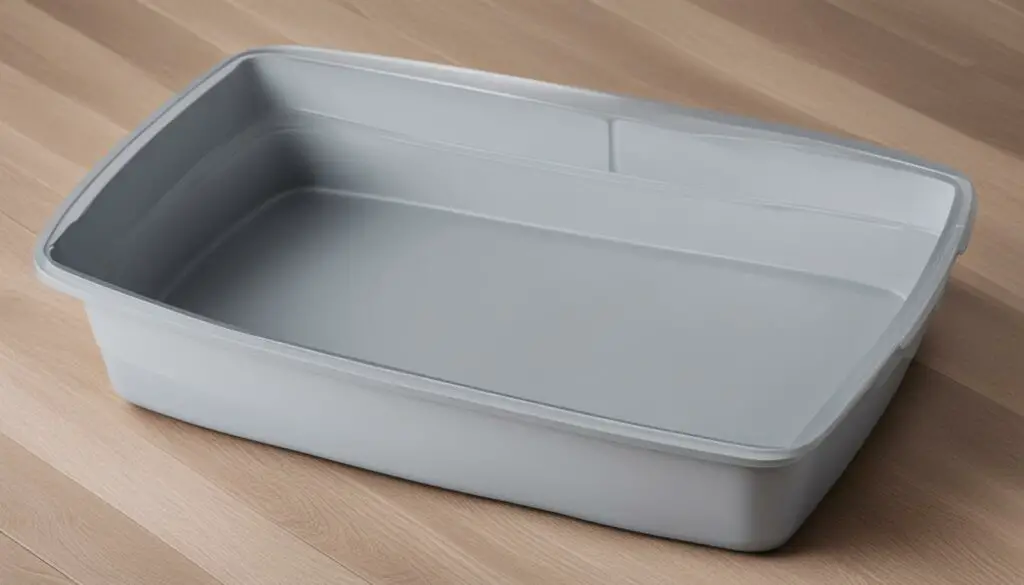
It’s important to address these litter box problems to prevent your cat from pooping on the bed. By ensuring your cat’s litter box preferences are met and creating a clean and comfortable environment, you can help encourage proper litter box usage and eliminate the frustration of finding poop on your bed.
Solutions for Stopping Inappropriate Pooping
Once the specific issue causing the cat’s inappropriate pooping has been identified, there are steps to take in order to stop the behavior. A vet visit is essential to rule out any underlying medical reasons for the pooping. Identifying and resolving the root cause, whether it’s litter box-related or stress-related, is important. Making the no-no pooping place unpleasant for the cat, using scents or deterrents, can discourage them from choosing that spot. Rewarding the cat for proper pooping in the litter box with praise and treats can reinforce good behavior. Following these steps can help break the habit of pooping on the bed.
| Solutions for Stopping Inappropriate Pooping | Benefits |
|---|---|
| Vet Visit | To rule out any underlying medical issues causing the behavior. |
| Identify the Issue | To understand the root cause and implement the appropriate solutions. |
| Make No-No Zones Unappealing | Using scents or deterrents to discourage the cat from choosing the bed as a pooping spot. |
| Reward Proper Pooping | By praising and giving treats to the cat when they use the litter box appropriately. |
Implementing these solutions can help redirect the cat’s behavior and prevent them from pooping on the bed. It’s important to be patient and consistent in your approach, as breaking a habit takes time. Alongside these solutions, providing a stress-free environment, maintaining a clean and comfortable litter box, and addressing any underlying medical issues will contribute to the overall success in stopping inappropriate pooping.
By understanding and addressing the reasons behind a cat’s bed pooping behavior, pet owners can effectively prevent and resolve this issue.
Remember, each cat is unique, and what works for one may not work for another. It’s essential to observe and understand your cat’s behavior to find the most suitable solution. If you’re still struggling to stop your cat from pooping on the bed, consulting with a professional cat behaviorist can provide additional guidance and support.

Possible Reasons for Cat Pooping on Bed
There are various reasons why a cat may choose to poop on the bed. Understanding these reasons can help pet owners address the issue and find appropriate solutions. Here are some possible explanations for this behavior:
Cat Illness
Certain illnesses can cause a cat to poop outside of the litter box, including intestinal parasites, food allergies, hyperthyroidism, diabetes, and other medical conditions. It’s important to consult a veterinarian to rule out any underlying health issues and provide proper treatment.
Environmental Changes
Cats can be sensitive to changes in their environment, such as moving to a new home or the introduction of new pets or children. These changes can cause stress and anxiety, leading to inappropriate elimination behavior. Gradual introductions and creating a calm and secure environment can help alleviate their bed pooping tendencies.
Untreated Cat Stress
If a cat is experiencing stress or anxiety that remains untreated, they may exhibit disruptive behaviors like pooping on the bed. Cats may become stressed due to changes in routine, lack of stimulation, or conflicts with other cats. Identifying and addressing the source of stress can help mitigate the bed pooping behavior.
Multi-Cat Households
In households with multiple cats, territorial behavior and competition for resources can contribute to a cat’s decision to poop on the bed. Providing ample litter boxes in different locations and ensuring equal access to resources can help minimize competition and reduce the likelihood of bed pooping in multi-cat households.
| Possible Reasons for Cat Pooping on Bed |
|---|
| Cat Illness (intestinal parasites, food allergies, hyperthyroidism, diabetes) |
| Environmental Changes (moving, introduction of new pets or children) |
| Untreated Cat Stress |
| Multi-Cat Households |
It’s important to note that every cat is unique, and the reasons behind their bed pooping behavior may vary. Observing their behavior, addressing any underlying health issues, and implementing appropriate solutions can help pet owners resolve this issue and provide a comfortable and stress-free environment for their feline companions.
Cat Illness as a Cause for Bed Pooping
Various illnesses can contribute to a cat’s decision to poop on the bed. These include worm infestations, such as hookworms, roundworms, and tapeworms, as well as intestinal parasites like giardia and toxoplasmosis. Inflammatory bowel disease, hyperthyroidism, food allergies, diabetes, liver disease, and even cancer can also be factors. It’s essential to consult a veterinarian to diagnose and treat any underlying medical issues causing the behavior.
When a cat is suffering from a worm infestation, the presence of these parasites in their digestive system can cause discomfort and irritation, leading to inappropriate defecation. Similarly, inflammatory bowel disease, characterized by chronic inflammation of the digestive tract, can result in diarrhea and other digestive issues that may lead a cat to seek alternative places to relieve themselves.
Hyperthyroidism, a condition caused by an overactive thyroid gland, can cause increased bowel movements and loose stools, making it more likely for a cat to poop outside of their litter box. Food allergies can also trigger gastrointestinal upset, resulting in changes in bowel habits. Additionally, conditions like diabetes, liver disease, and cancer can impact a cat’s overall health and digestive function, potentially leading to changes in their litter box behavior.
| Illness | Key Symptoms |
|---|---|
| Worm infestation | Weight loss, poor appetite, vomiting, diarrhea |
| Inflammatory bowel disease | Chronic diarrhea, frequent bowel movements, weight loss |
| Hyperthyroidism | Increased appetite, weight loss, increased bowel movements |
| Food allergies | Vomiting, diarrhea, gastrointestinal upset |
| Diabetes | Increased thirst, increased urination, weight loss |
| Liver disease | Jaundice, poor appetite, vomiting, diarrhea |
| Cancer | Weight loss, lethargy, poor appetite, vomiting, diarrhea |
Identifying and addressing these medical conditions is crucial in resolving a cat’s bed pooping behavior. A veterinarian can perform necessary tests to diagnose these illnesses and recommend appropriate treatment, which may involve medication, dietary changes, or other interventions aimed at managing the underlying condition. By addressing the cat’s health issues, pet owners can improve their cat’s overall well-being and reduce the likelihood of inappropriate elimination on the bed.
Environmental Changes and Cat Pooping on Bed
Environmental changes can have a significant impact on a cat’s behavior, including their choice of where to poop. Cats are creatures of habit, and any disruptions or alterations to their familiar surroundings can cause stress and anxiety, leading to undesirable behaviors such as pooping on the bed. These changes can include moving to a new home, reorganizing furniture or rooms, or the introduction of a new family member.
When it comes to changes in the household, it’s important to provide a gradual and smooth transition for your cat. This can involve maintaining a consistent routine, keeping their living space as familiar as possible, and introducing new elements slowly. For example, if you’re moving to a new home, create a designated safe space for your cat with their familiar belongings and gradually allow them access to the rest of the house. This will help reduce stress and make them feel more secure in their new environment.
Reorganizing furniture or rooms can also cause stress for cats. They rely on familiarity and a sense of territory, so sudden changes to their living space can be unsettling. If you need to reorganize, take it slow and allow your cat to adjust gradually. Introduce changes one area at a time and provide plenty of hiding spots and vertical spaces for them to feel secure.
The addition of a new family member, whether human or animal, can also disrupt a cat’s routine and trigger stress. It’s important to provide a gradual introduction and allow your cat to approach the new family member on their terms. Provide separate spaces and resources for your cat to retreat to if they feel overwhelmed. By taking these steps, you can help your cat adjust to the changes in the household and reduce the likelihood of them resorting to pooping on the bed.
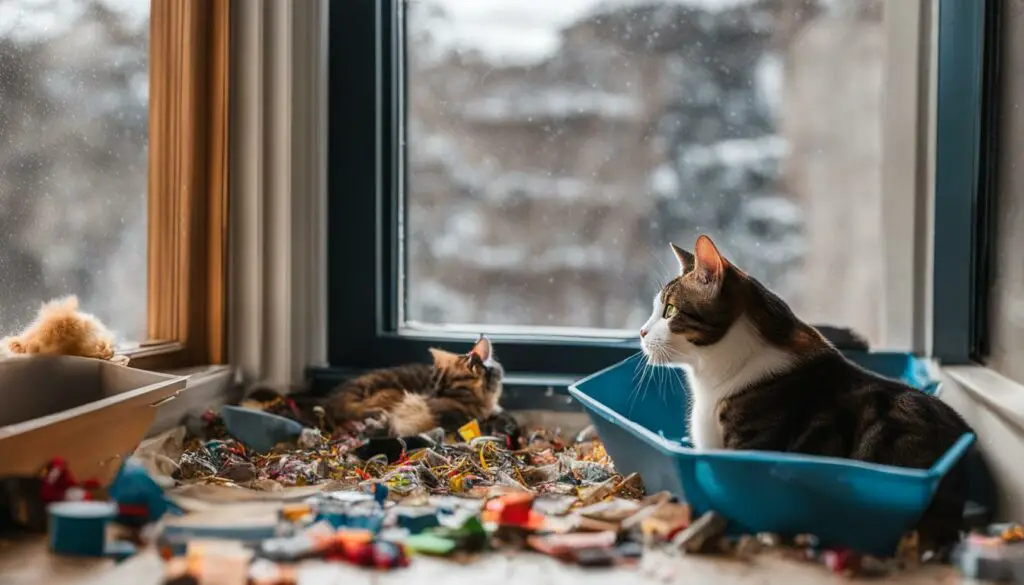
Untreated Cat Stress and Bed Pooping
Cats, like humans, can experience stress and anxiety, and this can manifest in various ways. When cats are feeling stressed or anxious, they may exhibit behaviors such as vomiting, diarrhea, excessive grooming, hiding, and aggression. In some cases, a cat may choose to poop on the bed as a way of expressing their feelings of stress and discomfort.
It’s important to identify and address the sources of stress in a cat’s environment in order to reduce bed pooping behavior. Providing outlets for play and interaction, creating a calm and secure environment, and establishing a routine can help alleviate stress in cats. Additionally, incorporating environmental enrichments, such as scratching posts, puzzles, and hiding spots, can provide mental stimulation and help reduce stress levels.
If a cat’s stress and bed pooping behavior persist despite attempts to alleviate the stress, it may be necessary to consult with a veterinarian or a professional animal behaviorist for further guidance and support.
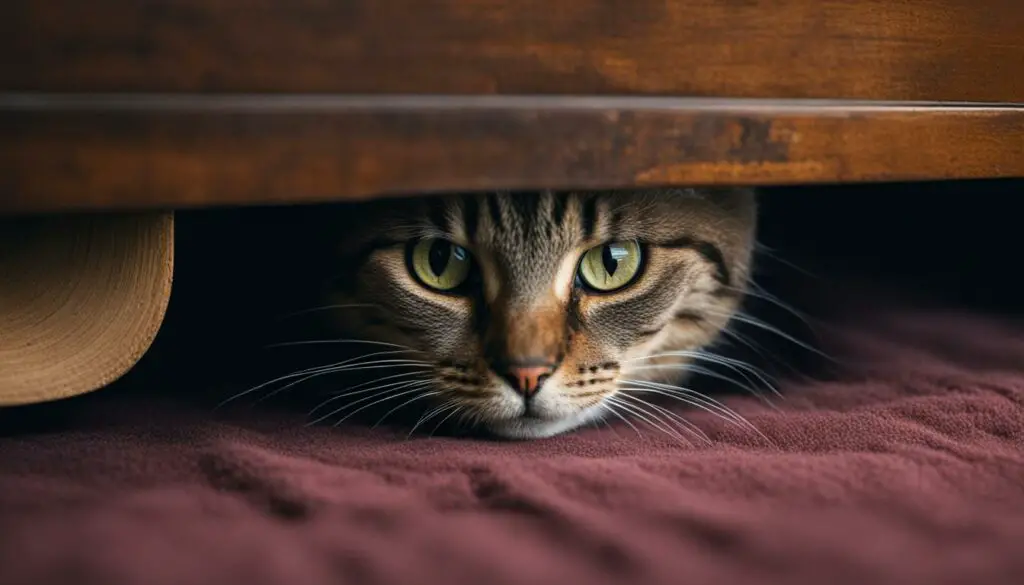
Understanding Cat Anxiety
Cat anxiety can be caused by various factors, such as changes in the environment, separation from their human companions, or the presence of other animals. It’s important to identify the specific triggers that are causing your cat’s anxiety and work towards addressing them.
A stressed cat may choose to poop on the bed as a coping mechanism or a way of marking their territory. By understanding the underlying causes of the anxiety and implementing appropriate strategies, you can help your cat feel more secure and reduce their bed pooping behavior.
Managing Cat Stress
There are several strategies you can employ to help manage your cat’s stress and reduce their bed pooping behavior:
- Provide a safe and comfortable space for your cat to retreat to when they’re feeling stressed. This could be a quiet room with their bed, toys, and a litter box.
- Establish a routine and stick to it as much as possible. Cats thrive on consistency and knowing what to expect.
- Use pheromone sprays or diffusers that mimic the natural calming hormones of cats to create a more soothing environment.
- Engage your cat in interactive playtime every day to help release pent-up energy and reduce stress.
- Consider providing your cat with puzzle toys or food-dispensing toys to keep their minds stimulated and help alleviate boredom.
| Signs of Cat Anxiety | Strategies to Reduce Anxiety |
|---|---|
| Vomiting | Provide a calm and secure environment |
| Diarrhea | Establish a routine and stick to it |
| Excessive grooming | Use pheromone sprays or diffusers |
| Hiding | Engage your cat in interactive playtime |
| Aggression | Consider providing puzzle toys or food-dispensing toys |
Multi-Cat Households and Bed Pooping
In multi-cat households, cats can engage in territorial behavior and compete for resources, which can lead to a cat choosing to poop on the bed instead of using a shared litter box. Territorial behavior is a natural instinct for cats, and they may mark their territory by eliminating in places they perceive as their own. The bed, with its soft and comfortable surface, can be an attractive target for a cat asserting its dominance or defending its territory against other cats.
Competition for resources, such as food, water, toys, and litter boxes, can also contribute to a cat’s decision to poop on the bed. If there is only one litter box available in a multi-cat household, it may not be enough to meet the needs of all the cats. Some cats may feel anxious or stressed about sharing the litter box or may be deterred by the presence of another cat while using it. This can lead to a cat seeking alternative places, like the bed, to relieve itself.
Providing Additional Litter Boxes
To address the issue of bed pooping in multi-cat households, it is important to provide an adequate number of litter boxes. As a general rule, there should be one litter box per cat, plus an extra one. This ensures that each cat has access to a clean and accessible litter box without feeling the need to compete or mark their territory. Multiple litter boxes should be placed in different areas of the house to provide cats with options and reduce the likelihood of territorial disputes.
In addition to providing additional litter boxes, it is essential to maintain cleanliness and hygiene in all litter boxes. Cats are clean animals and prefer a pristine environment for eliminating. Regularly scoop the litter boxes, change the litter as needed, and clean the boxes thoroughly to remove any odors that may discourage cats from using them. If a cat has already pooped on the bed, clean the area with an enzymatic cleaner to eliminate any lingering scent and prevent repeat incidents.
| Reasons for Bed Pooping in Multi-Cat Households | Solutions |
|---|---|
| Territorial behavior and competition for resources | Provide multiple litter boxes |
| Limited access to a single litter box | Place additional litter boxes in different areas of the house |
| Poor litter box hygiene | Maintain cleanliness and cleanliness of all litter boxes |
By understanding the dynamics of multi-cat households and addressing the underlying causes, pet owners can create a harmonious environment where all cats have their needs met and are less likely to engage in bed pooping behavior. Providing an adequate number of litter boxes and ensuring cleanliness and hygiene will help promote proper litter box usage and reduce the likelihood of territorial disputes among cats.

Dirty Litter Box and Bed Pooping
A dirty litter box can be a significant factor in a cat’s decision to poop on the bed. Cats prefer a clean and odor-free litter box, and if the litter box is dirty or has a strong odor, they may seek out alternative places to relieve themselves. Regular cleaning of the litter box, using clumping litter, and ensuring proper litter box hygiene can help prevent a cat from choosing to poop on the bed.
If you notice that your cat is pooping on the bed, it’s essential to evaluate the cleanliness of their litter box. Cats are incredibly clean animals, and they have high standards when it comes to their bathroom hygiene. A dirty litter box can cause your cat distress and discomfort, leading them to look for alternative places to relieve themselves, such as your bed.
To prevent this behavior, it’s crucial to clean your cat’s litter box regularly. Scoop out the waste daily and replace the litter as needed. Using clumping litter can make the cleaning process more manageable, as it allows you to remove the soiled litter easily. Additionally, make sure to sanitize the litter box regularly to eliminate any odors that may be lingering. Cats have a keen sense of smell, and a foul-smelling litter box may discourage them from using it.
By keeping the litter box clean and odor-free, you create an inviting environment for your cat to do their business. This helps ensure that they will choose the litter box over your bed as their preferred place to poop.
| Litter Box Hygiene Tips |
|---|
| Regularly scoop out waste |
| Replace litter as needed |
| Use clumping litter for easy cleaning |
| Sanitize the litter box regularly to eliminate odors |
Habit Formation and Breaking the Cycle
When a cat develops a habit of pooping on the bed, it can be a frustrating and challenging behavior to break. Cats are creatures of habit, and once they associate the bed with a place to eliminate, it can be difficult to redirect their behavior. However, with the right approach and consistent effort, it is possible to break this cycle and encourage proper litter box usage.
One effective strategy is to remove any scent marks left by the cat on the bed. Cats have a strong sense of smell, and if they detect their own scent on the bed, they may continue to view it as an appropriate place to poop. Using an enzymatic cleaner specifically designed to eliminate pet odors can help remove these scent marks and discourage the cat from returning to the bed. It’s important to follow the instructions provided by the cleaner manufacturer for best results.
In addition to removing scent marks, preventing access to the bed is crucial in breaking the habit. This can be done by closing the bedroom door or using physical barriers such as baby gates or furniture rearrangement to create a barrier between the cat and the bed. By removing the opportunity to poop on the bed, the cat will be encouraged to use the litter box instead.
| Steps to Break the Habit | Benefits |
|---|---|
| 1. Clean the bed with an enzymatic cleaner to remove any scent marks left by the cat. | – Eliminates the cat’s association of the bed with a place to eliminate. |
| 2. Prevent access to the bed by closing the bedroom door or using physical barriers. | – Removes the opportunity for the cat to continue pooping on the bed. |
| 3. Provide an alternative comfortable sleeping area for the cat. | – Redirects the cat’s preference for the bed to a designated sleeping area. |
| 4. Reinforce proper litter box usage by praising and rewarding the cat when they use the litter box. | – Encourages the cat to establish a positive association with the litter box. |
It’s important to note that breaking the habit of pooping on the bed may require patience and consistency. Cats may take time to adjust to the new routine and establish new habits. Providing an alternative comfortable sleeping area for the cat, such as a cozy cat bed or a designated spot with familiar bedding, can help redirect their preference from the bed to the designated area. Reinforcing proper litter box usage by praising and rewarding the cat when they use the litter box can also encourage them to develop a positive association with the litter box.
By following these steps and remaining consistent in your approach, you can help break the habit of pooping on the bed and encourage your cat to use the litter box appropriately.

Conclusion
In conclusion, if your cat has pooped on your bed, it’s important to understand the reasons behind this behavior and implement the appropriate solutions. Cats may choose to poop on the bed due to various factors, including illness, stress, environmental changes, litter box problems, and habit formation.
To effectively address the issue, it’s crucial to identify the specific cause of your cat’s bed pooping behavior. Consulting with a veterinarian is essential to rule out any underlying medical issues that may be contributing to the behavior. Once the medical aspect has been addressed, you can focus on resolving other potential triggers.
Creating a stress-free environment for your cat is key. This may involve minimizing environmental changes, providing comfort and reassurance, and addressing any separation anxiety. Additionally, ensuring a clean and comfortable litter box, with appropriate litter type and placement, is essential. Multiple litter boxes may be necessary in multi-cat households to prevent territorial issues.
Breaking the habit of pooping on the bed may require the use of enzymatic cleaners to remove scent marks and preventing access to the bed. Positive reinforcement can also help redirect your cat to using the litter box, rewarding them for appropriate bathroom behavior.
By understanding the reasons behind your cat’s bed pooping behavior and implementing the appropriate solutions, you can effectively prevent and resolve this issue, creating a clean and comfortable living environment for both you and your feline companion.
FAQ
Why did my cat poop on the bed?
Cats may poop on the bed due to illness, stress, environmental changes, litter box problems, or habit formation.
How can illness cause a cat to poop on the bed?
Illnesses such as IBS, cancer, and intestinal parasites can cause a cat to find a new place to poop due to pain or discomfort associated with the litter box.
What environmental changes can lead to a cat pooping on the bed?
Changes in the household, such as moving or introducing new pets or children, can disrupt a cat’s routine and cause stress or discomfort, leading to bed pooping.
How does stress and insecurity contribute to a cat pooping on the bed?
Cats can experience stress and insecurity, especially when they have recently arrived in a new home or have emotional attachment to their previous home and family, leading to bed pooping.
What litter box problems can contribute to a cat pooping on the bed?
Cats can be picky about their litter preferences, and issues such as the type of litter, litter box size, placement, cleanliness, and litter box bullying by other cats can lead to a cat choosing to poop on the bed.
How can I stop my cat from pooping on the bed?
The first step is to visit a veterinarian to rule out any underlying medical issues. Then, it’s important to address the specific issue causing the behavior and implement the appropriate solutions, such as making the bed an unpleasant spot, rewarding proper pooping, and providing a stress-free environment.
What are the possible reasons for a cat pooping on the bed?
Possible reasons include cat illness, environmental changes, untreated cat stress, multi-cat households, spiteful behavior, cat litter problems, and habit formation.
What illnesses can cause a cat to poop on the bed?
Illnesses such as worm infestations, inflammatory bowel disease, hyperthyroidism, food allergies, diabetes, liver disease, and cancer can contribute to a cat’s bed pooping behavior.
How do environmental changes contribute to cat pooping on the bed?
Changes in the household, such as moving to a new home or introducing new family members, can disrupt a cat’s routine and lead to bed pooping.
What can untreated cat stress lead to?
Untreated cat stress can manifest in various ways, including vomiting, diarrhea, excessive grooming, hiding, aggression, and pooping on the bed.
How do multi-cat households contribute to cat pooping on the bed?
In multi-cat households, cats may engage in territorial behavior and compete for resources, leading to a cat choosing to poop on the bed instead of using a shared litter box.
How does a dirty litter box contribute to a cat pooping on the bed?
Cats prefer a clean and odor-free litter box, and if the litter box is dirty or has a strong odor, they may seek out alternative places to relieve themselves, such as the bed.
How does habit formation contribute to cat pooping on the bed?
Once a cat has developed a habit of pooping on the bed, breaking that habit can be challenging. Using an enzymatic cleaner to remove any scent marks and preventing access to the bed can help break the habit and redirect the cat to using the litter box.

